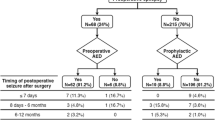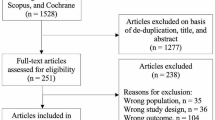Abstract
Meningioma is the most common type of primary brain tumor which presents with a variety of neurological manifestations. Surgical resection tends to be the preferred treatment. The occurrence of seizures after resection is common, which occur either early, within seven days of operation, or late. Our meta-analysis investigated the possible predictors of early and late postoperative seizures. We assessed the relevant observational studies on predictors of postoperative seizures published in PubMed, Scopus, and Web of Science from January 2000 to September 2022, and those that met inclusion criteria were included. We calculated the association between potential predicting factors and postoperative seizures, odds ratios (ORs) with 95% confidence intervals (CIs) applying either random or fixed-effect models. The early and late postoperative seizures were evaluated individually. Thirteen observational studies involving 4176 patients were included. Seizures occurred in 250 (6%) and 584 (14%) patients, respectively, in the early and late postoperative phases. Shared predictors for early and late seizures included tumors involving the motor cortex (OR = 2.7; 95% CI: 1.67–4.38, OR = 2.46; 95% CI: 1.68–3.61), postoperative neurological deficit (OR = 4.68; 95% CI: 2.67–8.22, OR = 2.01; 95% CI: 1.39–2.92), and preoperative seizures (OR = 2.52; 95% CI: 1.82–3.49, OR = 4.35; 95% CI: 3.29–5.75). Peritumoral edema (OR = 1.99; 95% CI: 1.49–2.64) was a significant factor only among late postoperative seizure patients while surgical complications (OR = 3.77; 95% CI: 2.39–5.93) was a significant factor solely for early postoperative seizures. Meningioma patients commonly experience early and late postoperative seizures. Identifying predictors of postoperative seizures is essential to diagnose and manage them effectively.



Similar content being viewed by others
Data availability
No datasets were generated or analysed during the current study.
References
Ogasawara C, Philbrick BD, Adamson DC (2021) Meningioma: a review of epidemiology, pathology, diagnosis, treatment, and future directions. Biomedicines 9(3):319
Szulzewsky F, Thirimanne HN, Holland EC (2024) Meningioma: current updates on genetics, classification, and mouse modeling. Ups J Med Sci. 18:129
Pawloski JA, Fadel HA, Huang Y-W, Lee IY (2021) Genomic biomarkers of meningioma: a focused review. Int J Mol Sci 22(19):10222
Harward SC, Rolston JD, Englot DJ (2020) Seizures in meningioma. Handb Clin Neurol 170:187–200
Englot DJ, Magill ST, Han SJ, Chang EF, Berger MS, McDermott MW (2016) Seizures in supratentorial meningioma: a systematic review and meta-analysis. J Neurosurg 124(6):1552–61
Elbadry Ahmed R, Tang H, Asemota A, Huang L, Boling W, Bannout F (2022) Meningioma related epilepsy- pathophysiology, pre/postoperative seizures predicators and treatment. Front Oncol 4(12):905976
Taphoorn MJB, Klein M (2004) Cognitive deficits in adult patients with brain tumours. Lancet Neurol 3(3):159–68
Gilliam F, Kuzniecky R, Faught E, Black L, Carpenter G, Schrodt R (1997) Patient-validated content of epilepsy-specific quality-of-life measurement. Epilepsia 38(2):233–6
Chaichana KL, Parker SL, Olivi A, Quiñones-Hinojosa A (2009) Long-term seizure outcomes in adult patients undergoing primary resection of malignant brain astrocytomas. J Neurosurg 111(2):282–92
Masroor M, Bakhshi SK, Shamim MS (2022) Seizure outcomes after meningioma resection. J Pak Med Assoc 72(4):776–8
Baumgarten P, Sarlak M, Monden D, Spyrantis A, Bernatz S, Gessler F et al (2021) Early and late postoperative seizures in meningioma patients and prediction by a recent scoring system. Cancers (Basel) 13(3):450
Zhang P, Li Y, Zhang J, Zhang H, Wang X, Dong L et al (2020) Risk factors analysis and a nomogram model establishment for late postoperative seizures in patients with meningioma. J Clin Neurosci 80:310–7
Mauritz M, Hirsch LJ, Camfield P, Chin R, Nardone R, Lattanzi S et al (2022) Acute symptomatic seizures: an educational, evidence-based review. Epileptic Disord 24(1):26–49
Beghi E, Carpio A, Forsgren L, Hesdorffer DC, Malmgren K, Sander JW et al (2010) Recommendation for a definition of acute symptomatic seizure. Epilepsia 51(4):671–5
Page M, McKenzie J, Bossuyt P, Boutron I, Hoffmann T, Mulrow CD et al (2021) The PRISMA 2020 statement: an updated guideline for reporting systematic reviews. BMJ 29(372):n71
Egger M, Smith G, Schneider M, Minder C (1997) Bias in meta-analysis detected by a simple, graphical test. BMJ 315(7109):629–34
Terrin N, Schmid CH, Lau J, Olkin I (2003) Adjusting for publication bias in the presence of heterogeneity. Stat Med 22(13):2113–26
Hayden JA, van der Windt DA, Cartwright JL, Côté P, Bombardier C (2013) Assessing bias in studies of prognostic factors. Ann Intern Med 158(4):280–6
Xu J, Yu Y, Li Q, Wu Z, **a L, Miao Y et al (2021) Radiomic features as a risk factor for early postoperative seizure in patients with meningioma. Seizure 93:120–6
Li X, Wang C, Lin Z, Zhao M, Ren X, Zhang X et al (2020) Risk factors and control of seizures in 778 Chinese patients undergoing initial resection of supratentorial meningiomas. Neurosurg Rev 43(2):597–608
Cai Q, Wu Y, Wang S, Huang T, Tian Q, Wang J et al (2022) Preoperative antiepileptic drug prophylaxis for early postoperative seizures in supratentorial meningioma: a single-center experience. J Neurooncol 158(1):59–67
Zheng Z, Chen P, Fu W, Zhu J, Zhang H, Shi J et al (2013) Early and late postoperative seizure outcome in 97 patients with supratentorial meningioma and preoperative seizures: a retrospective study. J Neurooncol 114(1):101–9
Fang S, Zhan Y, **e YF, Shi Q, Dan W (2013) Predictive value of electrocorticography for postoperative epilepsy in patients with supratentorial meningioma. J Clin Neurosci 20(1):112–6
Chen WC, Magill ST, Englot DJ, Baal JD, Wagle S, Rick JW et al (2017) Factors associated with pre- and postoperative seizures in 1033 patients undergoing supratentorial meningioma resection. Neurosurgery 81(2):297–306
Hwang K, Joo J-D, Kim Y-H, Han JH, Oh CW, Yun C-H et al (2019) Risk factors for preoperative and late postoperative seizures in primary supratentorial meningiomas. Clin Neurol Neurosurg 180:34–9
Ersoy TF, Ridwan S, Grote A, Coras R, Simon M (2020) Early postoperative seizures (EPS) in patients undergoing brain tumour surgery. Sci Rep 10(1):13674
Wang Y-C, Chuang C-C, Tu P-H, Wei K-C, Wu C-T, Lee C-C et al (2018) Seizures in surgically resected atypical and malignant meningiomas: Long-term outcome analysis. Epilepsy Res 140:82–9
Xue H, Sveinsson O, Bartek J, Förander P, Skyrman S, Kihlström L et al (2018) Long-term control and predictors of seizures in intracranial meningioma surgery: a population-based study. Acta Neurochir (Wien) 160(3):589–96
Islim AI, Ali A, Bagchi A, Ahmad MU, Mills SJ, Chavredakis E et al (2018) Postoperative seizures in meningioma patients: improving patient selection for antiepileptic drug therapy. J Neurooncol 140(1):123–34
Kemerdere R, Akgun MY, Alizada O, Toklu S, Tahmazoglu B, Tanriverdi T (2019) Risk factors for preoperative and postoperative late seizure in supratentorial meningiomas: a retrospective analysis of 63 patients. Roman Neurosurg 33(3):316–321. https://doi.org/10.33962/roneuro-2019-053
McGuinness LA, Higgins JPT (2021) Risk-of-bias VISualization (robvis): an R package and Shiny web app for visualizing risk-of-bias assessments. Res Synth Methods 12(1):55–61
Hage M, Plesa O, Lemaire I, Raffin Sanson ML (2022) Estrogen and progesterone therapy and meningiomas. Endocrinol 163(2):bqab259. https://doi.org/10.1210/endocr/bqab259
Le Rhun E, Weller M (2020) Sex-specific aspects of epidemiology, molecular genetics and outcome: primary brain tumours. ESMO Open 5(Suppl 4):e001034
Bartek J, Sjåvik K, Förander P, Solheim O, Gulati S, Weber C et al (2015) Predictors of severe complications in intracranial meningioma surgery: a population-based multicenter study. World Neurosurg 83(5):673–8
Dincer A, Jalal MI, Gupte TP, Vetsa S, Vasandani S, Yalcin K et al (2023) The clinical and genomic features of seizures in meningiomas. Neurooncol Adv 5(Suppl 1):i49-57
Lu VM, Wahood W, Akinduro OO, Parney IF, Quinones-Hinojosa A, Chaichana KL (2019) Four independent predictors of postoperative seizures after meningioma surgery: a meta-analysis. World Neurosurg 130:537-545.e3
Fiani B, Jarrah R, Bhandarkar AR, De Stefano F, Amare A, Aljameey UA et al (2023) Peritumoral edema in meningiomas: pathophysiology, predictors, and principles for treatment. Clin Transl Oncol 25(4):866–72
Wu A, Garcia MA, Magill ST, Chen W, Vasudevan HN, Perry A et al (2018) Presenting symptoms and prognostic factors for symptomatic outcomes following resection of meningioma. World Neurosurg 111:e149-59
Tang S, Liao J, Long Y (2019) Comparative assessment of the efficacy of gross total versus subtotal total resection in patients with glioma: a meta-analysis. Int J Surg 63:90–7
Baumgarten P, Sarlak M, Baumgarten G, Marquardt G, Seifert V, Strzelczyk A et al (2018) Focused review on seizures caused by meningiomas. Epilepsy Behav 88:146–51
Funding
The authors state that they did not receive any funds, grants, or any form of financial support while working on this manuscript.
Author information
Authors and Affiliations
Contributions
A.G. and A.Y. conceived and designed the study. M.A. and O.S. performed the systematic search. A.A., S.T., E.E.J., and M.M.A. extracted the date. Y.S.A., A.G., M.A., O.A. assessed the literature quality. A.S.A. performed statistical analyses. A.G., S.S.A., A.S.A, M.A., and M.M.A drafted the main manuscript. A.Y, A.G., Y.S.A., A.S.A., and A.J. edited the manuscript. A.Y. and A.J. supervised the study. All authors reviewed the manuscript and approved its final version.
Corresponding author
Ethics declarations
Ethics approval
Patients' informed consent and ethical approval were waived since we collected data from previously published studies with no recruited patients.
Consent to participate
Not applicable.
Consent to publish
Not applicable.
Competing interests
The authors declare no competing interests.
Additional information
Publisher's Note
Springer Nature remains neutral with regard to jurisdictional claims in published maps and institutional affiliations.
Previous Presentations
The abstract of this manuscript was presented as an E-POSTER in the 2023 American Association of Neurological Surgeons Annual Scientific Meeting (AANS), which was held in Los Angeles, April 21 – April 24, 2023.
Supplementary Information
Below is the link to the electronic supplementary material.
Rights and permissions
Springer Nature or its licensor (e.g. a society or other partner) holds exclusive rights to this article under a publishing agreement with the author(s) or other rightsholder(s); author self-archiving of the accepted manuscript version of this article is solely governed by the terms of such publishing agreement and applicable law.
About this article
Cite this article
Ghazou, A., Yassin, A., Aljabali, A.S. et al. Predictors of early and late postoperative seizures in meningioma patients: a systematic review and meta-analysis. Neurosurg Rev 47, 242 (2024). https://doi.org/10.1007/s10143-024-02487-w
Received:
Revised:
Accepted:
Published:
DOI: https://doi.org/10.1007/s10143-024-02487-w




